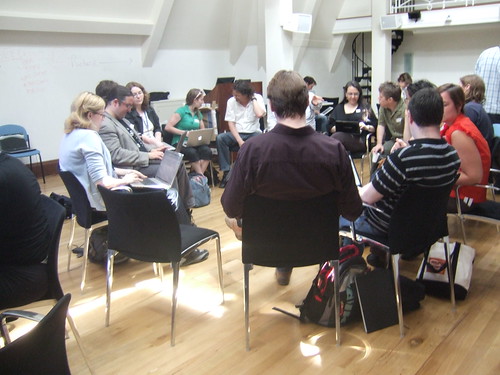What is a THATCamp?
Here are the key characteristics of a THATCamp:
- There are no spectators at a THATCamp; everyone participates.
- It is small and intimate, having anywhere from 25 or 50 to no more than 100 participants. Most THATCamps aim for about 75 participants.
- It lasts no more than two days.
- It is not-for-profit and inexpensive; it’s funded by small sponsorships (e.g., for breakfast) and by passing the hat around to the participants. Attendance should be free, but attendees can donate to cover expenses if they want.
- It’s informal: there are no lengthy proposals, papers, or presentations. The emphasis is on discussion or on productive, collegial work.
- It is also non-hierarchical and non-disciplinary: THATCamps welcome graduate students, scholars, librarians, archivists, museum professionals, developers and programmers, administrators, managers, and funders; people from the non-profit sector, the for-profit sector, and interested amateurs.
- Participants make sure to share their notes, slides, and other materials from THATCamp discussions before and after the event on the web and via social media.
What is an “unconference”?
According to Wikipedia, an unconference is “a conference where the content of the sessions is created and managed by the participants, generally day-by-day during the course of the event, rather than by one or more organizers in advance of the event.” An unconference is not a spectator event. Participants in an unconference are expected to present their work, share their knowledge, and actively collaborate with fellow participants rather than simply attend.
Who should attend?
Anyone with energy and an interest in the humanities and/or technology.
What are “the humanities”?
Good question. Turns out there’s a legal definition! As the National Endowment for the Humanities puts it: “According to the 1965 National Foundation on the Arts and the Humanities Act, ‘The term “humanities” includes, but is not limited to, the study of the following: language, both modern and classical; linguistics; literature; history; jurisprudence; philosophy; archaeology; comparative religion; ethics; the history, criticism and theory of the arts; those aspects of social sciences which have humanistic content and employ humanistic methods; and the study and application of the humanities to the human environment with particular attention to reflecting our diverse heritage, traditions, and history and to the relevance of the humanities to the current conditions of national life.’ ”
What is “technology”?
We suggest you read this brilliant article by Professor Leo Marx, American cultural historian at the Massachusetts Institute of Technology: “Technology: The Emergence of a Hazardous Concept.” (Side note: those who love technology should be those who are most aware of its hazards.)
What should I propose?
That’s up to you. Sessions at THATCamp will range from software demos to training sessions to discussions of research findings to half-baked rants (but please no full-blown papers; we’re not here to read or be read to.) You should come to THATCamp with something in mind, and on the first day find a time, a place, and people to share it with. Once you’re at THATCamp, you may also find people with similar topics and interests to team up with for a joint session.
How much?
THATCamp is free to all attendees, but a $20 donation towards snacks and coffee will be much appreciated by the organizers.
Is a THATCamp only for scholars / grad students / librarians / archivists / programmers / instructional technologists? Can scholars / grad students / librarians / archivists / programmers / instructional technologists apply?
No to the first, yes to the second. THATCamp aims at the broadest diversity of backgrounds and skills possible.



Per our conversation yesterday at MLA, I think this page could be helped by a “procedures” Q/A. I’m thinking, perhaps before or after “What should I propose?” Something like “What is a proposal?” or “How/when do I propose something to talk about at THATCamp?”
In terms of things that (may) make newbies nervous– I have found this sentence confusing: “There are no spectators at a THATCamp; everyone participates.” Mostly, the confusion arises out of a lack of an operationalized definition for “participates.” Asking questions and being engaged in others’ presentations is participation in my (limited) experience. But if one only has experience with academic conferences, one might think that everyone who attends has to prepare a paper. That is, I might say that I went to MLA this year but did not participate, and I think that would be correct for an MLA definition of participation, but not for a THATCamp, as I was here, tweeting, asking questions, and having conversations. So, I think that definition would be really useful!
I think the idea that it is non-hierarchical is mostly untrue. THATCamp does not follow traditional academic hierarchies, that is, a grad student is just as likely to ab accepted/listened to/ respected as a tenured prof. However, there are some pretty clear hierarchies about experience in DH. That experience for reasons having to do with tenure and promotion, the history of DH, and other reasons, doesn’t always (or even often!) map onto traditional academic hierarchy categories, but that doesn’t make it not a hierarchy. It does serve to make the hierarchies that are operating invisible, though, and I think it would be great to find ways to make them visible–whether it’s in order to reify them or to undermine them remains to be seen.
So those are some initial thoughts about clarifying what THATCamp is, or might be.